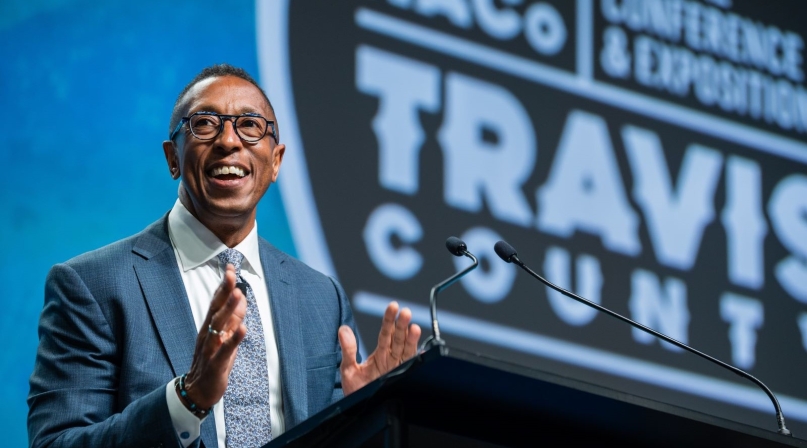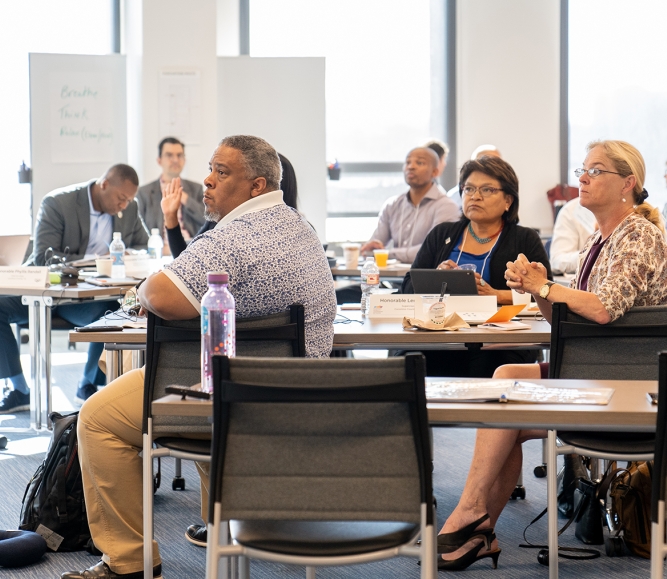Economic mobility is ‘more than just a paycheck,’ Allan Golston says

Key Takeaways
Counties play a critical role in economic mobility and opportunity, according to Allan Golston, president of the Bill and Melinda Gates Foundation’s U.S. Program, who spoke to county officials July 23 at the NACo Annual Conference’s second General Session.
The program’s team works with local leaders and engages in state and national policymaking to ensure every young person has the tools to succeed, regardless of race, gender, ethnicity or family income.
“We know that economic mobility is more than just a paycheck,” Golston said.
“It’s about feeling respect, it’s about dignity, it’s about feeling a sense of belonging and being valued in your community and it’s also about having the power and the autonomy to design your own future.”
The foundation, which supports NACo’s Economic Mobility Leadership Network, designed its economic mobility strategy through assessing data from grantees, spending time in communities speaking with people about their lived experiences and receiving input from over 300 local government leaders, Golston said.
The strategy has three pillars:
- Making it easier for people to access the $60 billion in safety net benefits that go unclaimed each year
- Working to create user-friendly tools and resources to help local leaders promote economic mobility in their communities
- Bringing partners together across all sectors to make the economic mobility field less fragmented.
“We have millions of hardworking people earning low incomes, who aspire to live healthy and productive lives, but their hopes are often dashed, because they face systemic barriers,” Golston said. “We have stagnant wages, low job quality, a lack of access to affordable housing, safety benefits and local services, and all of this combined causes people to stumble and not be able to achieve their potential.”
Golston cited that 90% of people born in the 1940s out earned their parents, while only 50% of people born in the 1980s are out earning their parents — with people who earn low incomes, people of color and people who live in rural communities disproportionately impacted.
“Some may look at this and get discouraged, but we at the Gates Foundation look at this and we commit to doubling down in partnership with colleagues, like you and local leaders, to do our part to contribute to changing the story,” Golston said.
“And one of the reasons that we’re motivated is because … we see that county leaders like you have a unique power and ability to boost economic mobility in your communities, to help residents move out of a path of poverty and to change those economic stories.”
Golston referenced examples of work in El Paso County, Texas; King County, Wash. and eastern Multnomah County, Ore. as ways counties can use existing resources to their benefit.
El Paso County created a new broadband survey that discovered it was overestimating the percentage of residents with access to high speed internet by 45% and was therefore able to do more work in its efforts; Multnomah County launched a Common Services Application pilot, creating a “one-stop shop” for people applying for benefits and King County used Results for America’s Economic Mobility Catalog, which has more than 200 case studies from local leaders, to address childcare worker compensation.
“Counties play a critical role in this work,” Golston said. “And it’s one of the reasons we’re deeply grateful for the partnership and NACo. While federal and state governments provide funding and resources, it’s local leaders like you that carry the baton across the finish line.”
Featured Initiative
Economic Mobility Leadership Network
The network supports county leaders to develop successful economic mobility strategies for their local communities.

Related News

Counties and Railroads: Shared Priorities for the Next Surface Transportation Bill
County leaders from across the country have a vital opportunity to ensure their infrastructure priorities are front and center.

House reintroduces bipartisan legislation to level playing field for rural communities
House reintroduced the Rural Partnership and Prosperity Act, bipartisan legislation intended to advance economic development in rural counties and overcome barriers to obtaining federal funding and resources.

